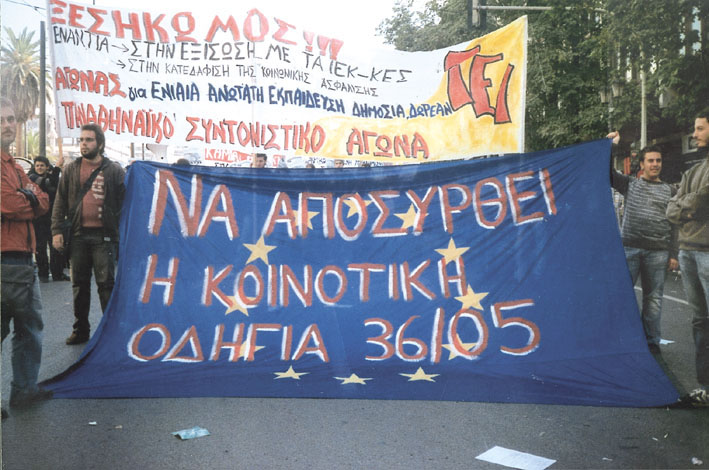Greek workers staged last Wednesday the biggest general strike in history against the proposed ‘reforms’ on pensions planned by the right-wing government of prime minister Kostas Karamanlis.
The strike was called by the GSEE (Greek TUC) and the ADEDY (public sector workers federation) and proved to be literally total.
Large factories, shipyards, engineering works, mines, communications, schools and universities, television and radio stations, theatres and museums, large and small department stores, banks, government offices, all were shut down.
Not a single train, bus nor tram moved out of their depots. Not a single ship sailed out of Greek ports.
Hospitals and power stations functioned on emergency levels.
Doctors, lawyers, civil engineers all participated in the strike closing down their offices.
In the capital Athens the Metro underground system functioned from 10am to 3pm so as to facilitate workers’ participation in the demonstration and rally.
And what a colossal, militant and original rally it was!
It proved simply impossible to even estimate the hundreds of thousands who marched for hours from one end of the Athens city centre to the other and back again.
Large, mass contingents of workers carrying their banners, especially made for the occasion, with placards and flags, shouting sharp and witty anti-government slogans.
The Greek working class angry and determined had occupied the centre of Athens.
Every single sector of the Greek working class marched united in their aim to smash the government plans.
Heavy industry, chemicals, shipyards, communications and transport workers in their thousands; public, bank, office and local government workers kept up a barrage of slogans and songs; hospital workers, teachers and large contingents of students from the Athens universities and colleges.
Women workers from the apparel and tobacco industries, shop workers and cleaners made a tremendous impression.
Journalists and radio and television technicians turned up in very high numbers.
Dancers, singers, actors, archaeologists, museum workers all with their own banners and imaginative happenings along the march.
Even lively contingents from middle class professionals such as doctors and lawyers.
The biggest contingent proved to be that of workers from Olympic Airways, the national air carrier threatened with immediate closure and privatisation.
It seemed that almost every single Olympic Airways technician, steward, pilot and office worker were present in the march.
They came prepared with two gigantic banners held by pilots, stewards and technicians carrying a simple yet most powerful message: Olympic Airways belongs to the Greek people and it will not be shut down!
Olympic Airways workers said that they are preparing ‘all kinds of action including occupations’ after Christmas.
What was new and original in the Greek general strike was the mass participation of young workers in their 20s and 30s.
A whole new generation of workers have entered the class struggle at a critical point – determined, as they shouted, not to be a generation with no social security nor pension.
Early on Wednesday morning pickets had to fight against management and strike breakers at some cement and chemical factories, refinaries and engineering works.
In the Athens city centre officials of the Ministry for Culture attempted to open the National Archaeological Museum, the biggest museum in Greece, a few hundred yards from the rally, but mass pickets of Ministry workers threw them out and locked up the museum’s gates.
At the GSEE and ADEDY rally, workers staged a happening where someone dressed up as a secret agent climbed up a ladder and wrapped up a spy camera overlooking the rally with a black cloth.
Workers are furious with the decision of the State’s chief persecutor to allow spy cameras to function and record demonstrations.
In the evening following the rally police arrested some electricity workers. But they were released after the GSEE intervened.
It was an incident that showed the state’s and the government’s willingness to carry on with their reactionary counter-revolutionary measures.
Throughout the rally and march, police helicopters hovered in the sky while armed police squads viciously attacked the so-called anarchist youths at the centre of the demonstration.
On the eve of the magnificent and historic general strike and march, the IMF (International Monetary Fund) issued their report on Greece which congratulated the government on their plans for pensions and further demanded immediate wage cuts, mass sackings legislation, ‘flexible’ working conditions imposed throughout, more taxes on basic goods and a one per cent VAT rise!
This is indeed the ‘reforms programme’ of the current Greek government and the cause of the colossal working class reaction.
It is a weak government holding a very slim parliamentary majority of just two, but they have the support of the PASOK social-democratic opposition.
Indeed in 2001 PASOK, then in power, attempted to impose a ‘pensions reform’ Bill that was withdrawn following a general strike.
Mass rallies were also held yesterday in all Greek cities and towns.
In Salonica, the industrial centre of northern Greece, over 50,000 workers marched against the government’s plans.
The Greek Communist Party (KKE) held their own separate rallies and marches in Athens and other cities.
Last Wednesday’s 24-hour general strike was an historic event and showed the high intensity and advanced state of the class struggle in Greece.
That was pointed out in a pamphlet distributed by the Trotskyists of the Revolutionary Marxist League who called for the overthrow of the Karamanlis government and for a Workers’ and Small Farmers’ socialist government.
The counter-revolutionary Karamanlis government no doubt will press on with the pensions and wages ‘reforms’ as demanded by the European Union and the IMF.
The Greek workers’ general strike, revolutionary in essence, is not a Greek phenomenon; it is part of the tremendous resistance of the European and world working class against the vicious capitalist attacks on every single right won by workers.
It takes place, and it is indeed fuelled by the recent world economic crisis and slump.
The Greek general strike proved above all that this is the period of revolutionary upheavals.
